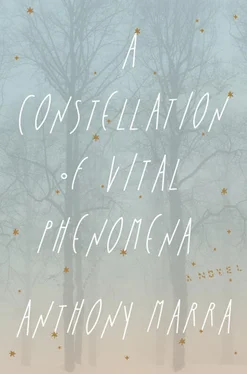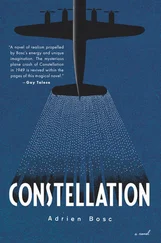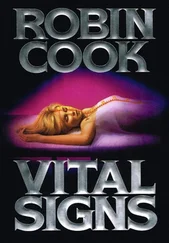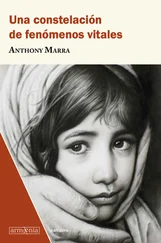“Even you know that, Ula. You just have to look at how each turned out.”
When Khassan returned home, Ramzan was sitting at the table, though sitting generously described his posture, which slumped so low the chair back loomed over his head. The sharp reek of liquor coated the air. Perhaps it had dissolved his son’s spine.
Teetering against the table, Ramzan kept his voice steady; he still hadn’t seen his father at the door. “There’s nothing to eat and I can’t shit. I don’t understand it, do you? How can I be constipated when you’ve given all the meat to those filthy dogs? The sleeping pills. Maybe it’s that. Maybe it’s the weather. Maybe December has frozen my bowels.” He spoke in the vacant monotone of a man who knew no one was listening, and it was awful for Khassan to hear his son’s voice, whittled by loneliness, addressing an empty chair. A few years earlier, Khassan hadn’t been able to get him to answer a yes-or-no question; now no question Ramzan posed and answered was so simple.
If not for Ula, Khassan would have shut the door and returned to his dogs. He would have followed them through the alleyways, through the refuse-strewn gutters, to the thin strips of twig shadow that made mazes on the forest floor, until their upturned snouts pointed to him, eager, hungry. If not for Ula, he would have ignored his son’s voice in the morning and at midday and in the evening, when he said good-bye to his pack and returned home to prepare his insulin shot. The day would have silently joined the hundreds of others, if not for Ula. But he had spoken to Ula, and the relief of unburdening still lifted him, and today, he decided, would be the day he spoke to the one person who was waiting to hear from him.
“You can’t shit?” he asked softly. He had forgotten the tone of chastisement. “It could be the sleeping pills you take to fall asleep among ghosts. It could be Alman, or Musa, or Omar, or Aslan, or Apti, or Mansur, or Aslan the Hirsute, or Ruslan, or Amir, or Amir Number Two, or Isa, or Khalid, or even Dokka. Probably Dokka.” He layered his voice with all the animosity it could sustain. He had never spoken this way. For one year, eleven months, and four days the pleas, admonitions and prayers he had wanted to utter never left his lungs. The weight of all he hadn’t said hung like a dead organ in his chest. He could barely breathe. He, too, knew what it was to have waste you cannot dislodge.
Ramzan’s face lit with surprise. “I’ve been waiting to hear you say that,” he said. A beaming grin stripped the shadows from his features. Khassan’s silence had been so long and lonesome that to Ramzan this voice of denouncement was both victory and absolution. The sound of his father’s voice was all that mattered; its message was irrelevant. “But you can’t speak to me like that,” he added, clasping tightly to the thread and hoping argument would unspool more of his father’s voice.
“You’re telling me how to speak?” Khassan’s temples throbbed. “A son tells his father? A boy? A …” He stopped before belittling Ramzan’s manhood.
“You think you live ten centimeters off the ground, but who gets you the food you throw away to mutts?” Ramzan spoke with slow, savage joy, pinning each word to his father. “In fifty kilometers I couldn’t find enough aspirin to dull a hangover, but every other week I bring you insulin. You should be grateful. I allow you both to survive and to resent me for it.”
Khassan’s breaths couldn’t come fast enough. A dull, vise-like clarity crushed whatever fatherly affection survived the silence. For all the lies Ramzan lived by, he was still capable of speaking the truth, and it was for the truth, rather than the lies, that Khassan hated him. He had once held his hand over Ramzan’s bassinet and the boy’s fingers had wound around his like little vines. He had once lifted the boy and seen miracles in his deep, unblinking eyes. “You are nothing to me,” he finally said.
But Ramzan, still grinning, still unaccountably joyous, said, “Just like your book? Are you going to carry me to the woods and burn me?”
“I treasured that book more than anyone.”
“I know, more than my mother.”
“She knew exactly who I was when she accepted my proposal.”
“She thought you were Albert Einstein, that the honor of your genius would compensate for your neglect. You treat your dogs better.”
“That’s not true,” Khassan said, uncertain how the conversation had turned against him.
“A genius, she thought. As if Albert Einstein would forget his wife’s birthday.”
What had possessed him to speak? Two more silent years would hurt less than one more minute of this. He had expected Ramzan’s vehemence, his blather, but hadn’t expected his concision. Hadn’t expected that the son who had destroyed his reputation, his name, his faith in human goodness, would find new ways to ruin him. More than his paternal failures, it was the grinning joy his son took in describing them that Khassan would remember. Eyes skewed with jubilation. Khassan recognized them as his own. It was the conversation he’d feared since Ramzan’s birth. Since the woman who wasn’t Mirza had said, in an exhausted ache, a word that should have wrapped them together: “Ours.” Since he had held him, no more than a bald head and blankets, and wished the child in his arms were Akhmed. You poor thing. You never had a chance.
“I haven’t been a good father, I know, I know, I know, I know, I know, I know, I know, I know, I know, I know,” and he kept repeating it, the needle stuck on this one proclamation he stated and restated so Ramzan wouldn’t. “But I never hurt you,” he said finally. “I never laid a finger on either of you.”
“You were a mouth that only opened to eat. Just like now. And what’s worse is you squandered what you had. You were physically capable of having a wife and son, but you didn’t want us.”
“I’m sorry for what happened to you,” he said. Even in apology he couldn’t name it. March 2, 1995, eight days after Ramzan’s twenty-third birthday, he’d never forget the day. The transport truck didn’t slow down when Ramzan was pushed from the back. The adult diapers they’d dressed him in were maroon. Finding his boy, right there, in the road, my god, his horror had left him speechless. Akhmed had treated Ramzan’s wound and was the only other villager to know of it. For weeks Khassan had tended to his son, taking him meals in bed, reading him pulp fiction, coaxing the spark of life from his dull, brutalized eyes. Ramzan had never recovered, not fully, not physically, not existentially. The Landfill had snapped him as cleanly as a branch and all the tea and small talk in Chechnya wouldn’t put his halves back together. He never spoke of what had happened there. His pride for what he had done and his disgrace for the consequence were so entwined that he couldn’t even tell his father that he had been castrated for refusing to inform on his neighbors. “I mourn the life you weren’t able to experience,” Khassan said. “For the father you might have become, for all our sakes.”
“And I mourn the father you might have been,” Ramzan said. The taunt peeled from his voice and behind it lay unvarnished, unfathomable need. Khassan’s face felt so heavy. He had expected false accusations, dissemblance; he hadn’t expected honesty. The floorboards ached as he turned to the door. In his head he heard the jingle from the television show that had followed the nightly news in the seventies, a stupidly cheerful song, sung by collective laborers, whose melody had once worked on his ears like a reverse alarm clock, a ringing that had let him know it was time to sleep, to rest, to dream; and though he hadn’t thought of the song in years, it came to him now, every note, and he hummed it beneath his breath as he held the doorframe, and wanted to die.
Читать дальше











